Chart of the Week: 40% of customers are highly satisfied with agent-assisted methods of communicating with companies
Customer experience (CX) is a huge part of driving engagement, sales and repeat custom. While companies understand why good CX is vital, there seems to be a disconnect between what customers view as good CX and what businesses think create great experiences.
According to new research from NICE inContact, businesses tend to underestimate customers’ satisfaction with agent-assisted methods of customer service while over-estimating satisfaction when it comes to self-service methods like chatbots.
Download our Free Resource – 10 common website customer experience mistakes
This guide reveals examples of poor website design from different sectors which are commonly seen, but best avoided.
Access the
While the rise of customer service methods like automated assistants and chatbots is increasing and customers are getting used to them, they may not be offering the experience that companies believe they are.
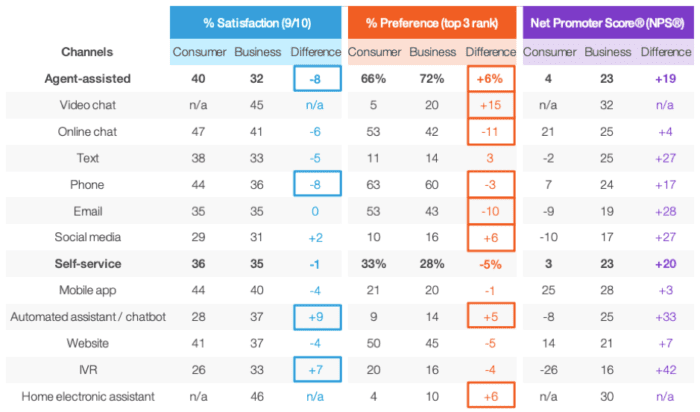
The research suggests that agent-assisted methods are still the best option for providing customer service, with more consumers preferring these options. However, companies seem to believe that self-service methods are the way forward.
More agent-assisted experiences
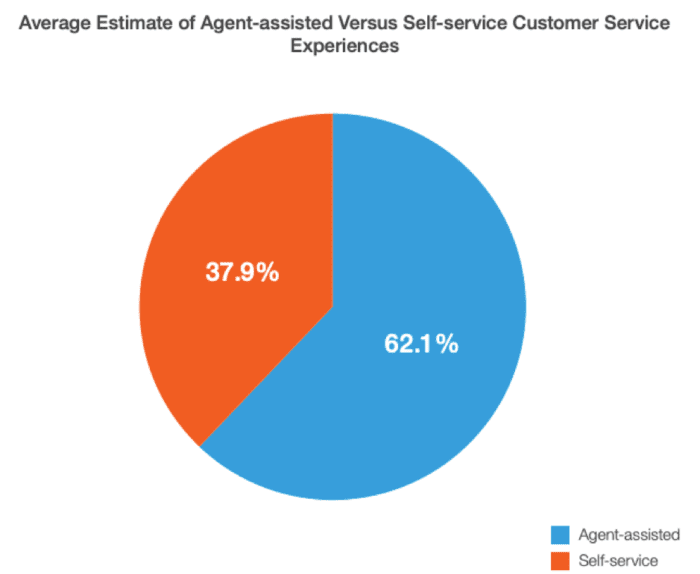
Currently, it is estimated by businesses that more customer service experiences are agent assisted, with just four out of ten being self-service. This means that customers are used to talking directly to an agent, whether via online chat, on the phone, email or social media.
Overall, this implies that customers receive a personalized and responsive level of service, with the human element allowing companies to deliver a high level of service and meet a customer’s expectations.
Businesses obviously see the benefits in this level of service, as the majority of companies offer customer service options that allow consumers to speak directly to an agent, whether by phone, email or online chat.
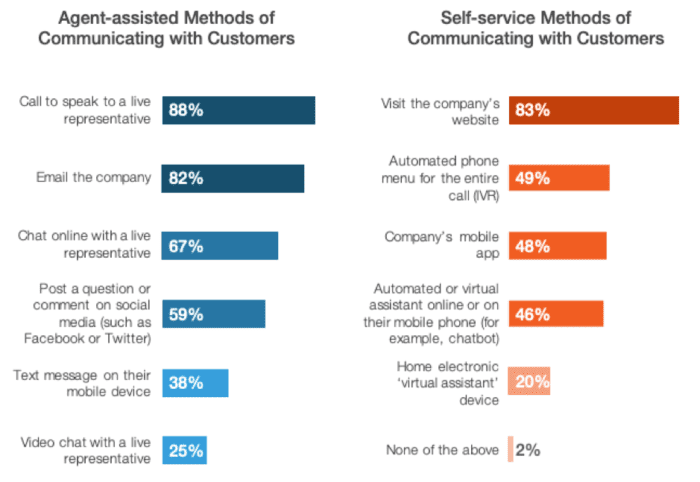
In comparison, fewer companies offer self-service customer experience methods. While the majority of businesses surveyed (83%) enable customers to visit a website in order to interact with a brand, a small number (2%) don’t offer any self-service methods despite offering agent-assisted methods.
Businesses underestimate customer satisfaction
The research shows that customers are fairly happy with agent-assisted methods of communications, with 40% of those surveyed being highly satisfied overall. In comparison, businesses are less likely to rate this form of customer service as being highly satisfying, suggesting that companies underestimate how important they are to CX.
For customers, online chat is the best agent-assisted method of communicating with a business with 47% being highly satisfied with this method. This is possibly due to the ease with which customers are able to talk with an agent using this method, as they can simply type a query while on a company’s social media page or its website. It also means they can perform other tasks while waiting for a response.
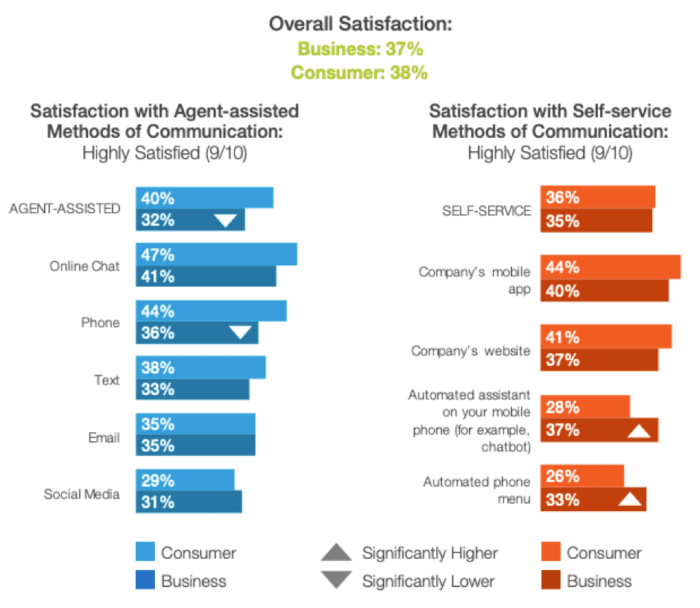
While this customer service method was deemed to be highly satisfying for customers, it is less so for businesses. Just 41% of businesses are satisfied with this method, which could be related to the costs associated with having customer service agents on-hand to respond to online chats.
Customers are also very happy with phone calls when it comes to contacting a company, with 41% saying they are highly satisfied with this type of communication. Once again, fewer businesses (36%) said the same. This shows that consumers are likely to feel like they get better service and have a better experience when the human element is involved, something that organizations seem to underestimate.
When it comes to self-service methods of communications, more businesses (35%) are highly satisfied with these methods compared to agent-assistant options. While more consumers (35%), overall, are satisfied with self-service communications options compared to businesses, there is less satisfaction than with agent-assisted methods.
There are significant differences between companies and consumers when it comes to automated assistants on mobile phones - such as chatbots – (37% versus 28%) and automated phone menus (33% versus 26%). This suggests that companies may be putting too much focus on communication methods that customers are not happy with, which can ultimately affect their experience.
Contact preferences
While phone calls that enable them to speak to a live representative are customers’ top method of communicating with a company (63%), they over half (53%) will also either email or chat online with a live representative. In terms of agent-assisted methods, these are customer’s top three choices.
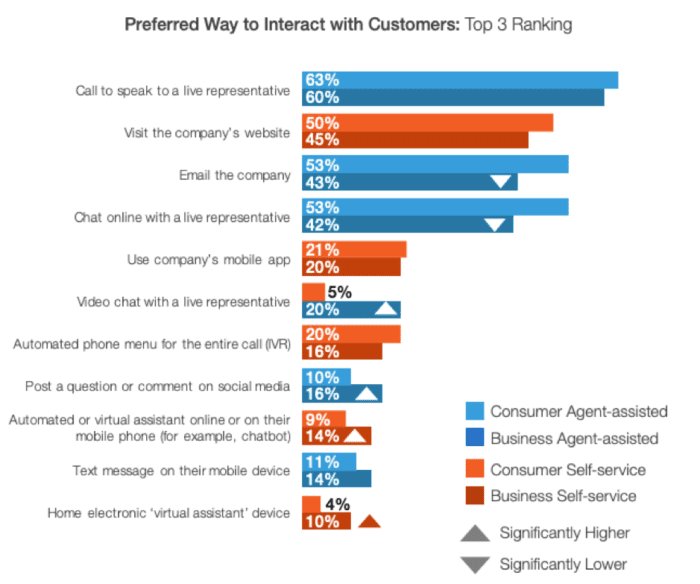
Although 60% of businesses prefer to interact with customers via phone calls, which is on par with customers’ preferences, much fewer want to interact by email or online chat. Just 43% of companies say that email is a preferred contact method, while 42% will opt for online chat with a live representative.
Companies are more likely than customers to opt for video chat options (20% versus 5%), social media posts (16% versus 10%), chatbots (14% versus 9%), SMS (14% versus 11%) or virtual assistant devices (10% versus 4%) when it comes to communicating with consumers. This shows a disconnect between how businesses interact with customers and how customers want to be interacted with.
Contact dislikes
When it comes to the least popular ways for businesses to interact with consumers and vice-versa, both customers and companies are in agreement. Both chose social media as the least popular communication method, despite customers expecting brand responses on social media within 30 minutes. This could be because customers do not want to air their issues on a public forum and companies would rather any issues not be visible to other customers or potential customers.
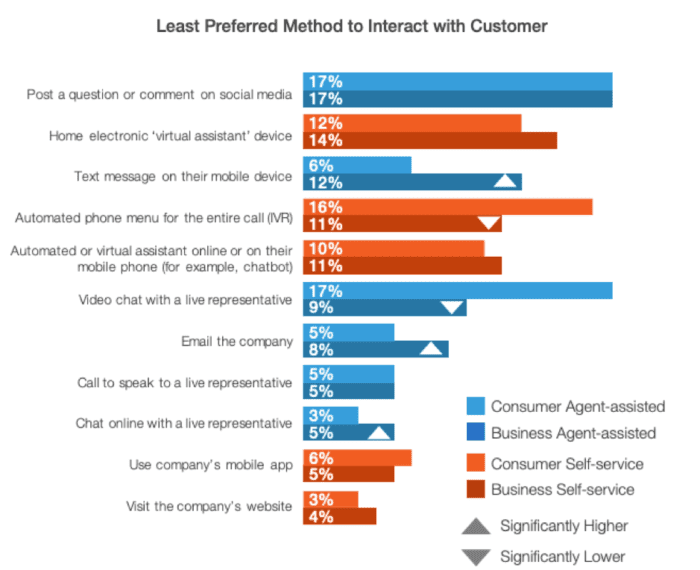
However, the same number of customers (17%) said they dislike talking to a live representative over video chat, which is a preferred contact method for many companies, suggesting that this is the wrong direction for businesses to go in.
The majority of customers also do not prefer self-service methods for communicating with companies. Some 16% dislike automated phone menus for an entire call, with 10% would rather not deal with an automated or virtual assistant online (such as chatbots). A further 12% are also not fans of home electronic ‘virtual assistant’ devices, although companies agree with this.
Customer recommendations based on experience
Customer reviews and recommendations can have a big influence on shopping behaviour, with 30% of shoppers believing that product reviews show understanding from retailers. However, businesses are underestimating how likely customers are to recommend their company based on the experience they have with certain forms of communication.
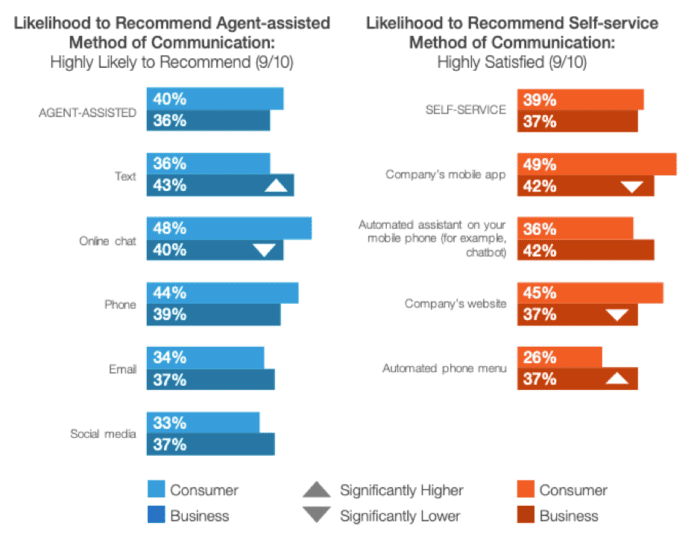
Overall, more customers are highly likely to recommend a company based on its agent-assisted methods of communications (40%) compared to their self-service methods (39%). However, businesses are not seeing the value that some of these agent-assisted methods offer.
One of the biggest differences is online chat with a live representative. Some 48% of customers said they are highly likely to recommend a company if they receive good service via this communication method, but only 40% of businesses believe that this is the case. Similarly, 44% of customers will make a recommendation based on phone service, but just 39% of companies say customers will do this.
Companies seem to think that customers are highly likely to recommend a business based on text communications, with 43% saying this is the case. However, only 36% of customers agree with this. Businesses also overestimate the influence of email and social media communication when it comes to company recommendations.
In terms of self-service methods, companies think that chatbots have a big influence on customer recommendations, with 42% saying that customers will be highly likely to recommend their business based on this communication method. However, only 36% of customers concur, further showing the divide between agent-assisted and self-service methods of communication.
Solving a problem
Customer experience is improved when an issue can be resolved upon first contact and yet companies are underestimating how likely it is that customers are happy with a resolution after initially contacting a business.
Overall, customers report high rates of first contact resolution across all communication methods, with the results being dramatically higher than companies’ estimations. While 50% of companies say that issues are handled during the first phone call, a massive 71% of customers say the same, suggesting that phone calls are still a valid option for customer service.
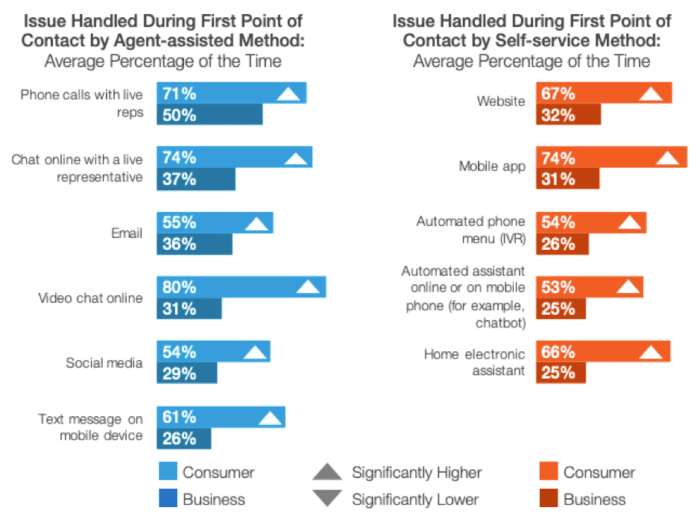
Although customers seem to dislike the contact option, 80% say that they meet a resolution during their first online video chat with a customer. In comparison, less than a third (31%) of companies estimate that this is the case.
Similarly, while customers prefer agent-assistant communication methods, they appear to be satisfied with the results of self-service communications. Some 74% say issues raised over a mobile app are likely to be handled during the first contact (compared to 31% of companies). Some 67% say the same about websites, 66% about home electronic assistants and 53% chatbots.
Final thoughts
While customers seem to prefer the human element when it comes to customer service, with more store being put in agent-assisted methods of communications, there is no denying that self-service options still get results.
Although customers report that solutions like chatbots are less adept at dealing with an issue on first contact than phone calls, live chat and email, they are still dealing with problems in a timely manner.
This shows that companies can benefit from automated options, which are time and cost saving, but they also need to consider what customers want and expect. While some customers are happy with a chatbot or mobile app, a greater proportion still want the customer service options that allow them to talk to a person.
Businesses can benefit from offering a range of communication methods in order to better suit a broad range of customer preferences, as this will allow them to talk to customers in the manner that best suits them. Ultimately, this is only going to benefit them when it comes to creating the best possible CX.















